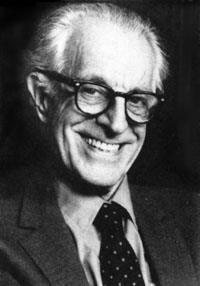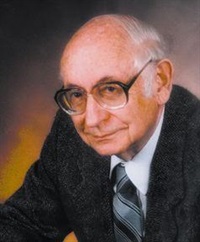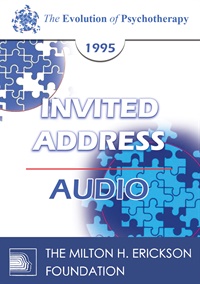EP95 Invited Address 06b - From Psychoanalytic to Behavioral Methods in Anxiety Disorders: A Continuing Evolution - Joseph Wolpe, MD
- Average Rating:
- Not yet rated
- Topic Areas:
- Invited Addresses | Psychoanalysis | Anxiety | Psychotherapy | Research
- Categories:
- Evolution of Psychotherapy | Evolution of Psychotherapy 1995
- Faculty:
- Albert Ellis, PhD | Joseph Wolpe, M.D.
- Duration:
- 1:31:10
- Format:
- Audio Only
- Original Program Date:
- Dec 14, 1995
- License:
- Never expires.
Description
Description:
Invited Address Session 6 Part 2 from the Evolution of Psychotherapy 1995 - From Psychoanalytic to Behavioral Methods in Anxiety Disorders: A Continuing Evolution
Featuring Joseph Wolpe, MD, with discussant Albert Ellis, PhD.
Moderated by William Matthews, Jr, PhD.
In the early decades of the 20th century Freud's mastery of the craft of presenting a case enthroned a belief that anxiety disorders were caused by repressed emotional complexes and that recovery required the restitution of repressed ideas. This belief dominated psychotherapeutic practice, and even though little was to be seen in the way of success, any alternative was treated with scorn. Mid-century studies of experimental neuroses showed that these disturbances were the consequence of the learning of maladaptive anxiety and could be overcome by systematic counteraction by other emotions. These findings, transferred to humans, were gratifyingly successful, but the published findings were ignored or belittled. Meanwhile, an increasing repertoire of relearning methods was developing including cognitive correction for subclasses of maladaptive anxieties based on misinformation. Recently, social pressures for cost-effective treatment of anxiety disorders have brought behavior therapy widening attention and thus for the first time it has been discussed as a primary therapy for anxiety disorders in journals of the American Psychiatric Association.
Educational Objectives:
- Given a client, show that the achievement of lasting diminution of neurotic disturbance is the most significant index of the potency of psychotherapy.
- To recount the disappointing experiences with psychodynamic methods that led to a search for alternatives, and how experimental neuroses came to be seen as a model with clinical potential.
- To describe various experiments that established the therapeutic efficacy of conditioning methods in experimental and clinical neuroses, and how clinical derivatives continue to emerge from behavioral paradigms.
*Sessions may be edited for content and to preserve confidentiality*
Credits
Faculty

Albert Ellis, PhD Related Seminars and Products
Albert Ellis, PhD, was an American psychologist who in 1955 developed Rational Emotive Behavior Therapy (REBT). He held M.A. and Ph.D. degrees in clinical psychology from Columbia University and American Board of Professional Psychology (ABPP). He also founded and was the President of the New York City-based Albert Ellis Institute for decades.
He is generally considered to be one of the originators of the cognitive revolutionary paradigm shift in psychotherapy and one of the founders of cognitive-behavioral therapies.[2]
Based on a 1982 professional survey of US and Canadian psychologists, he was considered as the second most influential psychotherapist in history (Carl Rogers ranked first in the survey; Sigmund Freud was ranked third).[3][4] Psychology Today noted, "No individual—not even Freud himself—has had a greater impact on modern psychotherapy."[5]

Joseph Wolpe, M.D. Related Seminars and Products
Joseph Wolpe, MD, was a South African psychiatrist, one of the most influential figures in Behavior Therapy. Wolpe grew up in South Africa, attending Parktown Boys' High School. Joseph received his M.D. in 1948 from the University of Whitatersrand in Johannesburg, South Africa. He was Emeritus Professor fo Psychiatry and Former Director of Behavior Therapy Unity at Temple University Medical School. He was Professor of Psychiatry at the Medical College of Pennsylvania. One of the leading practitioners of behavior therapy, he has authored three books and co-edited two, and has more than 200 professional publications. He cofounded the Journal of Behavior Therapy and Experimental Psychiatry. He is receipient of the Distinguished Scientific Award for the Applications of Psychology from the American Psychological Association.


